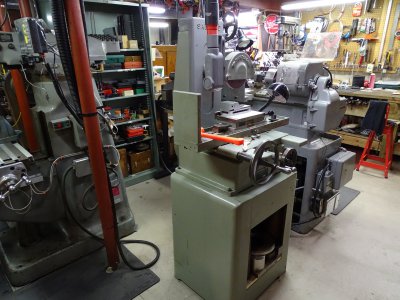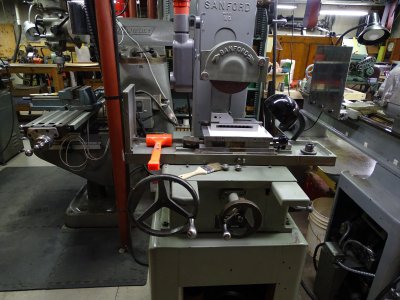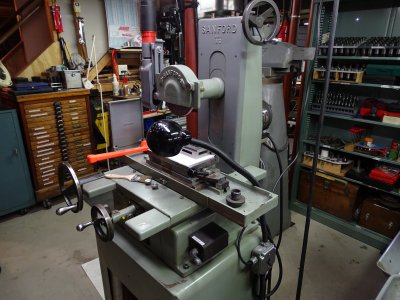@projectnut , this is a really interesting question, and has sharpened a line of thinking that has been popping into my head recently on reading some of the posts on this forum recently.
Fear not! To avoid polluting this thread with my related but tangential thoughts, I'll post those in another thread.

So, to answer the OP, since I'm stubbornly currently in the process of testing my principle that: "
I've damn well got this 7x14 mini-lathe, so I'm going to fettle, improve and add upgrades to it as much as I can, then use it for as long as I can, before its limitations make me get something more capable", a new-to-me old-English-iron lathe is off the table of purchases for the time being.
So, I'm currently looking for a milling machine. I simply
cannot fit a medium/large mill (and I consider the mini Bridgeport type mills as medium) in my workshop (I've got all that bloody plastic to find a home for!

). So I'm looking for something compact. I'm also a
bit budget limited so it's used for me. Even if I wasn't budget limited, we don't have an equivalent to PM here in the UK; Warco is probably the nearest, but I'd put them only a little bit beyond Grizzly in terms of standards. Having burned a fair bit of time on sorting out the Chinese 7x, I don't want to have to repeat the process with a mill.
To that end I'm on eBay and Facebook marketplace looking for a good deal on something like one of the RF25 or RF30 clones, or possibly one of the more compact Adcock and Shipley horizontal machines,
but only if they have a vertical head accessory included in the sale (the vertical heads are rocking horse poo; apparently they tended to have been chucked in a cupboard when industrial company bought the machines, and then chucked in a skip 20 years later during the clear-outs such companies have).
I am currently in discussion with someone about a really quite tidy Astra L2/L4 (not the one
@Ben17484 had, I should say) with a good chunk of tooling and a vertical head. I'll find out later today if I can get it for about £400. It's about an hour's drive away, and it's compact enough to fit in my car with the rear seats down. It's also not going to be difficult to fit in my workshop and possible to move into position in my workshop without major drama.
The lack of a quill or fine feed on the vertical head may well turn out to be a PITA but eh, for the price and the rigidity of the machine (as compared with say a mini-mill or even an RF clone perhaps), I reckon it's a potentially good purchase.
One thing about the above that is germane to some of the implicit points in the OP by
@projectnut, is that the reason I got into this hobby is a love of the problem-solving process. Coming up with a modification to enable fine Z movement, is just the kind of problem solving that floats my boat (I have some ideas already and you can bet if I score this machine, you'll be seeing posts about that topic).
Funnily enough, the mention in this thread of the surface grinder being indispensable is something I can relate to; specifically as an owner of a 7x14 Chinese mini-lathe. Having access to a surface grinder would make some of the more vital fettling tasks much, much easier. But then who has a 7x Chinese mini-lathe
and a surface grinder?

I'd love a surface grinder (for the above reason and also just because

) and it seems the usual used suspects are not
wildly expensive, but they're all quite big buggers; there don't seem to be that many compact examples available. I've seen one benchtop surface grinder I could probably have fitted into my workshop on an engineering auctions company's website but it sold before I got the chance to bid on it.
I also fancy one of the little BCA jig borers but they always go for well over £1000 and there's the space issue again (I have to have
some workbench space free!

) so that's a pipe dream for now.





